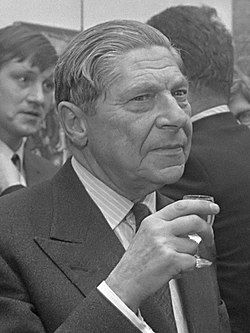Arthur Koestler Quote
What had he said to them? I bow my knees before the country, before the masses, before the whole people.... And what then? What happened to these masses, to this people? For forty years it had been driven through the desert, with threats and promises, with imaginary terrors and imaginary rewards. But where was the Promised Land? Did there really exist any such goal for this wandering mankind? That was a question to which he would have liked an answer before it was too late. Moses had not been allowed to enter the land of promise either, But he had been allowed to see it, from the top of the mountain, spread at his feet. Thus, it was easy to die, with the visible certainty of one's goal before one's eyes. He, Nicolas Salmanovitch Rubashov, had not been taken to the top of a mountain; and wherever his eye looked, he saw nothing but desert and the darkness of night.
What had he said to them? I bow my knees before the country, before the masses, before the whole people.... And what then? What happened to these masses, to this people? For forty years it had been driven through the desert, with threats and promises, with imaginary terrors and imaginary rewards. But where was the Promised Land? Did there really exist any such goal for this wandering mankind? That was a question to which he would have liked an answer before it was too late. Moses had not been allowed to enter the land of promise either, But he had been allowed to see it, from the top of the mountain, spread at his feet. Thus, it was easy to die, with the visible certainty of one's goal before one's eyes. He, Nicolas Salmanovitch Rubashov, had not been taken to the top of a mountain; and wherever his eye looked, he saw nothing but desert and the darkness of night.
Related Quotes
About Arthur Koestler
Having moved to Britain in 1940, Koestler published his novel Darkness at Noon, an anti-totalitarian work that gained him international fame. Over the next 43 years, Koestler espoused many political causes and wrote novels, memoirs, biographies, and numerous essays. In 1949, Koestler began secretly working with a British Cold War anti-communist propaganda department known as the Information Research Department (IRD), which would republish and distribute many of his works, and also fund his activities. In 1968, he was awarded the Sonning Prize "for [his] outstanding contribution to European culture". In 1972, he was made a Commander of the Order of the British Empire (CBE).
In 1976, Koestler was diagnosed with Parkinson's disease and in 1979 with terminal leukaemia. On 1 March 1983, Koestler and his wife Cynthia died of suicide together at their London home by swallowing lethal quantities of barbiturate-based Tuinal capsules.
